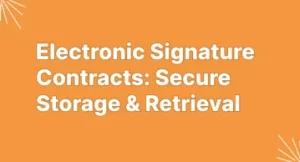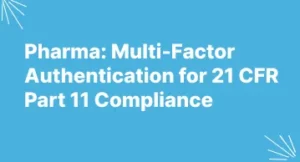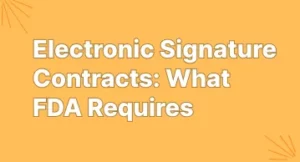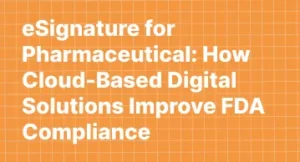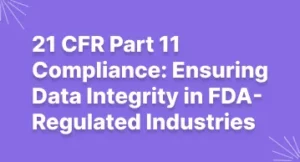Pharmaceuticals: Why Pharma, Biotech, & Medical Devices Rely on 21 CFR Part 11 Compliance
Introduction
In the highly regulated world of pharmaceuticals, biotechnology, and medical devices, ensuring compliance with stringent guidelines is not just a choice—it’s a necessity. The U.S. Food and Drug Administration’s 21 CFR Part 11 regulation plays a critical role in governing electronic records and electronic signatures, ensuring data integrity, security, and traceability.
For companies operating in these industries, compliance with 21 CFR Part 11 is essential to meet regulatory requirements, avoid legal risks, and maintain product quality and patient safety. This blog explores why 21 CFR Part 11 compliance is indispensable and how it impacts key areas such as GxP regulations and electronic patient consent forms.
Understanding 21 CFR Part 11 Compliance
21 CFR Part 11 is a set of regulations established by the U.S. Food and Drug Administration (FDA) to ensure that electronic records and electronic signatures are trustworthy, reliable, and equivalent to paper records and handwritten signatures.
Key Requirements of 21 CFR Part 11:
- Electronic Records Management: Digital documents must be protected against unauthorized access, tampering, and data loss.
- Audit Trails: To ensure transparency, all changes to a document must be logged with timestamps, details about the change, and the identity of the person making the change.
- Electronic Signatures: Each digital signature should be unique to an individual, verifiable, and securely linked to its corresponding record.
- Access Controls: Only authorized personnel should be able to access and modify critical documents.
- Data Integrity & Security: Systems must ensure that stored data is complete, consistent, and accurate throughout its lifecycle.
Non-compliance with 21 CFR Part 11 can lead to regulatory enforcement actions, legal consequences, financial penalties, and reputational damage. Therefore, pharmaceutical, biotech, and medical device companies must adopt validated Part 11-compliant solutions like MSB Docs to meet these requirements effectively.
Why 21 CFR Part 11 Compliance is Essential for Regulated Industries
1. Ensuring Compliance with GxP Regulations
In regulated industries, GxP regulations (Good Manufacturing, Laboratory, and Clinical Practices) set the foundation for quality, safety, and efficacy. 21 CFR Part 11 extends these principles by requiring that digital processes uphold strict regulatory standards.
For example, in pharmaceutical manufacturing, electronic batch records must be tamper-proof,auditable, and securely stored to meet Good Manufacturing Practices (GMP). Similarly, in clinical research, Good Clinical Practice (GCP) guidelines require electronic trial data to be secure and traceable.
By ensuring 21 CFR Part 11 compliance, companies can demonstrate adherence to GxP regulations, support successful regulatory inspections, and reduce the risk of audits, legal issues, and product recalls.
2. Improving the Management of Patient Consent Forms
For companies involved in clinical trials and medical research, obtaining and managing patient consent forms is a critical aspect of ethical and legal compliance. Traditionally, paper-based consent forms were prone to errors, misplacement, and forgery.
With electronic patient consent forms, companies can:
- Securely collect and store patient approvals.
- Ensure authenticity and non-repudiation through compliant electronic signatures.
- Maintain a complete audit trail for verification and inspection purposes.
This approach improves patient trust and expedites research processes, making it easier to meet regulatory requirements without compromising data integrity or security.
Challenges in Achieving 21 CFR Part 11 Compliance
Despite its critical importance, achieving 21 CFR Part 11 compliance presents several challenges:
- Complex regulations that require extensive documentation, validation, and periodic review.
- The need for secure, validated systems to track changes, maintain audit trails, and prevent unauthorized modifications.
- High compliance costs when using outdated,inefficient, or non-validated record-keeping methods.
To address these challenges, organizations need a robust, validated solution like MSB Docs, which simplifies compliance by offering advanced digital record-keeping and eSignature capabilities that align with 21 CFR Part 11 requirements.
How MSB Docs Helps in 21 CFR Part 11 Compliance
MSB Docs is a leading electronic signature and document management solution designed to help pharmaceuticals, biotech, and medical device companies comply with FDA regulations effortlessly. Here’s how:
1. Secure & Compliant Electronic Signatures
MSB Docs provides legally binding eSignatures that ensure:
- Unique user authentication.
- Tamper-evident document seals.
- Automatic timestamps and attribution for regulatory traceability.
2. End-to-End Audit Trails
MSB Docs automatically logs every document action —including sending, viewing, collecting consent, and signing—with secure, precise timestamps, ensuring complete transparency for regulatory audits and inspections.
3. Robust User Access Controls
Only authorized personnel can access and modify critical records, reducing the risk of unauthorized changes and enhancing compliance.
4. Data Security & Integrity
- End-to-end encryption to safeguard sensitive information against cyber threats.
- Automated backups and disaster recovery protocols to prevent data loss.
- Version control to track document changes over time.
5. Seamless Integration with Pharma & Biotech Workflows
- Easily integrates with clinical trial management systems and pharmaceutical document management platforms.
- Supports compliant digital patient consent workflows.
- Streamlines submission and approval processes.
- Enhances operational efficiency while maintaining regulatory readiness.
The Growing Importance of Digital Compliance in Pharmaceuticals
With the rapid adoption of digital solutions, regulatory authorities expect pharmaceutical, biotech, and medical device companies to implement compliant electronic systems. Adopting MSB Docs ensures companies stay ahead of compliance requirements while enhancing operational efficiency.
Additionally, companies that leverage digital solutions for compliance gain a competitive edge by reducing manual errors, improving data accuracy, and streamlining document approvals.
Final Thoughts
For companies in pharmaceuticals, biotech, and medical devices, compliance with 21 CFR Part 11 is non-negotiable. From ensuring adherence to GxP regulations to securely managing patient consent forms, 21 CFR Part 11 plays a crucial role in maintaining data integrity and regulatory approval.
By implementing MSB Docs, organizations can confidently meet 21 CFR Part 11 requirements, enhance data security, and accelerate document workflows—all while supporting the highest standards of patient safety and product efficacy.
Ready to ensure seamless 21 CFR Part 11 compliance? Discover how MSB Docs can help your organization take the next step toward secure and efficient digital compliance today.



